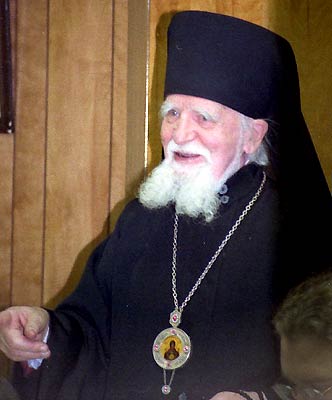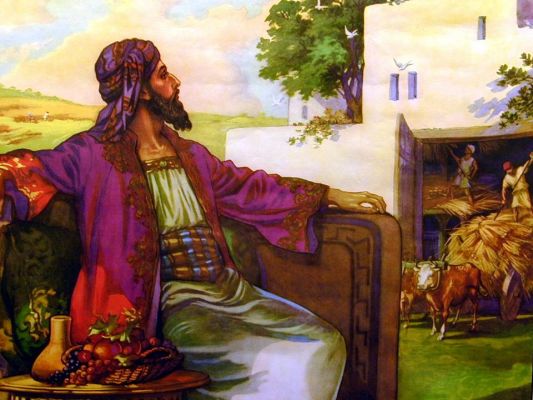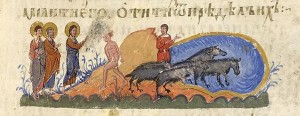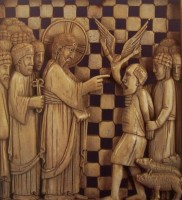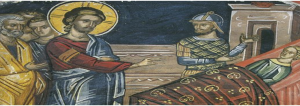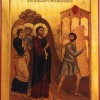And He spake a parable unto them, saying, The ground of a certain rich man brought forth plentifully: And he thought within himself, saying, What shall I do, because I have no room where to bestow my fruits? And he said, This will I do: I will pull down my barns, and build greater: and there will I bestow all my fruits and all my goods. And I will say to my soul, Soul, thou hast much goods laid up for many years; take thine ease, eat, drink, and be merry. But God said unto him, Thou fool, this night thy soul shall be required of thee: then whose shall those things be, which thou hast provided? So is he that layeth up treasure for himself, and is not rich toward God (Luke 12:16-21).
The Gospel reading about the foolish rich man sets before us the question of life itself. When asked what we live for, many people reply: “life is given to us for living.” Hence it follows that we should “eat, drink, and be merry, for life is short.” Those who reason in this manner are usually satisfied by their ability to set themselves up in life, sink into prosperity, and grow fat. By adding participation in public life, they receive praise and applause. With a wide and complacent smile, they think their lives to be happy.
Are these people truly happy? One of Chekhov’s heroes answers this question for us. He spends his entire life, like everyone else, in his daily concerns; he played a role in society and occupied himself with “important affairs,” having resort to falsehood therein; he played his part, immersed in petty intrigues and public concerns. Then suddenly, unexpectedly, he wakes up one night in a cold sweat with severe palpitations. What happened? Something terrible: he realized that life had passed him by and was no more; a burden on his soul was all that was left, for his life was without real meaning.
Some people supposed – and some continue to suppose even now – that they could give meaning to their lives through participating in political parties and fighting for a better future, as did Russian socialists and democrats of all persuasions. What was this “idealized future” in Russia’s past and what is it now in today’s political parties? “The idealized future,” Professor Semyon Frank notes correctly, “is a spiritual illness, the ultimate root of that moral illness that we call revolutionism, which ruined Russia.”
Then what should we do, how should we be spending our lives for them to be meaningful? Is there some common cause for all people, through participation in which everyone can acquire the meaning of life? This common cause for all people does exist. Men and brethren, what shall we do? asked the Apostle Peter after his inspired preaching. He answered: Accept Christ, Repent, and be baptized every one of you in the name of Jesus Christ for the remission of sins, and ye shall receive the gift of the Holy Spirit (Acts 2:37-38). The essential common cause for all is indicated in the Apostle’s answer: accept Christ and live by the dictates of the Holy Spirit. St. Seraphim says: “Acquire the Holy Spirit!” And Christ Himself – in reply to the question What shall we do? – says: This is the work of God, that ye believe on Him Whom He hath sent (John 6:28-29). Christ further points out the two eternal commandments: love for God with all one’s heart, all one’s strength, and all one’s mind; and love for one’s neighbor. He thus indicates the common cause for all, which gives meaning to life.
None of us should seek those subjective and private pleasures that are so easily and clearly exposed as meaningless and illusory in our lives, but rather a life that is full of meaning. Life, with its brevity and shadowy pleasures, its hardships and needs, is not an end in itself. Life is meaningful only when it is driven by desire for the Absolute Good, which is good for both my neighbor and for me. We have an example of such good in love. Tell me: when we love with real love, what are we looking for? What is it about it that satisfies us?
If we want to taste only its private joys, if we want to make use of our loved one and our relationship with them only as a means for personal gain and pleasure, then this will not be real love, but rather an insult to our neighbor and depravity. Such an attitude will invariably be punished with spiritual emptiness and coldness of soul, often ending in embitterment.
If we want to give our lives in service to our neighbor, to our loved one; if we are willing to sacrifice ourselves, even to die for the sake of our loved one, then we will receive joy, spiritual fulfillment, and calm contentment as a result.
The love that gives meaning to life is not calculating, it is not an egotistical desire for pleasure; it is love, not servitude. Love means surmounting our egoism and our selfish ends, thereby giving meaning to our lives along with that fullness in which my ego wholly merges with that of my loved one. But if the lover and the beloved plunge themselves – as we so often see happen – into the meaningless whirl of life, then they will ultimately be overwhelmed by an oppressive feeling of emptiness and frustration, absurdity and impotence.
Then how can we give meaning to our lives, so as not to fall into spiritual darkness, so as not to be deprived of light, spiritual vitality, and peace of soul?
We have already received the answer to this from the mouths of the Apostle Peter and the Savior Himself.
The true path, the meaningful path, the reasonable path of life is in Him Who Himself is Truth and Life. Christ says: I am the way, the truth, and the life (John 14:6). In Christ we find the true good.
Tell me: where has the tireless labor of millions led, labor in the pursuit of “life for life’s sake” without Christ and apart from God? Tireless labor without Christ and apart from God creates meaninglessness, it creates hell on earth, it has created a desert in which people perish from spiritual thirst. Calls for truth and justice sound from high tribunes, from those who have rejected the Absolute Source of Truth. For this reasons the results are grim: the vast majority of people do not know what they are living for, where good and truth are to be found.
Dear brothers and sisters, the life in Christ is the common cause for all people, for all times and nations. It is not theory, but action – practical, vital action. At the root of this action is the spiritual work we each do on ourselves, with each person gathering the power of good, love, and truth. This action culminates in everyone with the words of the Apostle Paul: not I, but Christ liveth in me (Galatians 2:20).
Today’s Gospel reading calls us to this, to become rich toward God (Luke 12:21). The Lord says: I have set before you life and death, blessing and cursing: therefore choose life, that both thou and thy seed may live – and live in light and joy (Deuteronomy 30:19). Amen.
Translated from the Russian












